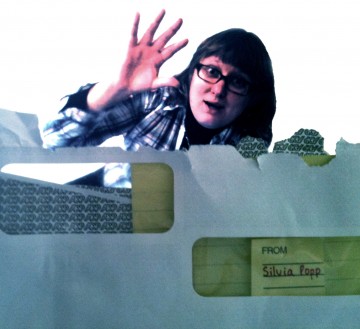Silvia Popp is a video/action artist based in Zurich, Switzerland. Some of her recent projects include STUDIO ACTION, Pamela’s Boutique, Leerstand (Vacancy), and Liberation Station.
STUDIO ACTION is collaborative initiative co-created by Zurich artists Popp and Anja Moers. The group runs with the motto “Think. Talk, Act.”
Lily Rossebo: “Action Art” is not a term frequently used in the United States. How would you describe this method of working? What interests you about the concept of action?
Silvia Popp: For my work and also for STUDIO ACTION, site-specific work is quite essential (as we were talking about Action Art, I will focus on STUDIO ACTION for the moment). A place has a history, a past, a present, and a future. A place is where actions are taken part – so place is the starting point. We are a collaborative work group and are quite interested in work models, work processes and codes.
What is the modern definition of work? Art work? (To address these questions) we adopt business strategies, play with business language and do experiments in and with our office/studio. At the moment we are working on a stranded cubicle – the cubicle as the so-called ideal work place in the 60’s, stranded on island, destroyed and almost forgotten.
LR: How does your work respond to place? I hear rumors you might be headed to New York City? How do you think this change in location will influence your work?
SP: Yes indeed, we would like to explore the big apple and do some research and of course do some work there. NYC is one of the busiest cities in the world with a quite interesting history. Therefore it offers STUDIO ACTION many possibilities to develop its business strategies outside of our well-known environment and tactics.
As for working and living in a different culture/ NYC…What will the different work strategies be? There will be different business rules and codes – what would happen if you would change those codes? — this is something I would be very interested in to know and to explore.
LR: I first met you during the development of the Liberation Station, a project, which aims to create public interventions through comical and therefore cleansing activities. Your major contribution to the Liberation Station is the public “Tortenschlacht”* (the act of throwing a pie in someone else’s face).
In the UK, we saw many positive results to the “Tortenschlacht.” The pie in the face resulted in a general increase in public happiness. Do you think public will respond in a similar way in different cities/or with different socio-economic groups?
SP: As someone interested in public intervention, I think the “Tortenschlacht” has a lot of potential. At our premiere in London, I felt all the excitement before and happiness afterwards. It is a rather well-known action in slapstick silent movies and screwball comedies. We are bringing these elements back; disclose the action to the public.
Getting a pie in your face is also used as a political gesture so-called pie-ing (some kind of Action Art, which brings us to this term again), to protest against an evil originator with a sweet slap in his face. The contradiction of the sweet pie and slap in your face is probably what makes these actions interesting as well as controversial.
In Berlin, there is even a company organizing professional “Tortenschlachten” — of course in a separate room, especially equipped for the battle – which exclude all the elements you have doing this as a public interventions or statement.
A brief Swiss history lesson by Silvia:
The image above shows the famous Swiss battle of Sempach (1386), where the Swiss fought against the Habsburger (Austrian Aristocracy) once again for their independence.
The pie, by the way, is called Prinz Eugen Torte. Prinz Eugen was an Austrian prince, close with the Habsburger, but reigned/ruled a little bit later around 1600 (an inside joke for me).
If they had pies instead of weapons, well… then there would be a different history now.
